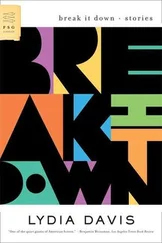Lydia Davis - Almost No Memory
Здесь есть возможность читать онлайн «Lydia Davis - Almost No Memory» весь текст электронной книги совершенно бесплатно (целиком полную версию без сокращений). В некоторых случаях можно слушать аудио, скачать через торрент в формате fb2 и присутствует краткое содержание. Год выпуска: 2001, Издательство: Farrar, Straus and Giroux, Жанр: Современная проза, на английском языке. Описание произведения, (предисловие) а так же отзывы посетителей доступны на портале библиотеки ЛибКат.
- Название:Almost No Memory
- Автор:
- Издательство:Farrar, Straus and Giroux
- Жанр:
- Год:2001
- ISBN:нет данных
- Рейтинг книги:3 / 5. Голосов: 1
-
Избранное:Добавить в избранное
- Отзывы:
-
Ваша оценка:
- 60
- 1
- 2
- 3
- 4
- 5
Almost No Memory: краткое содержание, описание и аннотация
Предлагаем к чтению аннотацию, описание, краткое содержание или предисловие (зависит от того, что написал сам автор книги «Almost No Memory»). Если вы не нашли необходимую информацию о книге — напишите в комментариях, мы постараемся отыскать её.
. In each of these stories, Davis reveals an empathic, sometimes shattering understanding of human relationships.
Almost No Memory — читать онлайн бесплатно полную книгу (весь текст) целиком
Ниже представлен текст книги, разбитый по страницам. Система сохранения места последней прочитанной страницы, позволяет с удобством читать онлайн бесплатно книгу «Almost No Memory», без необходимости каждый раз заново искать на чём Вы остановились. Поставьте закладку, и сможете в любой момент перейти на страницу, на которой закончили чтение.
Интервал:
Закладка:
At last I walked back to the bar. I don’t know why I was so sure he would still be there. I went in and looked around the room. There were a few men standing over their drinks, watching me. Mr. Knockly was not one of them. I looked back into a smoky corner and saw two prostitutes sitting silently together. Their legs were crossed, their bare arms rested on the table in front of them. I went closer and saw that Mr. Knockly was there. He lay asleep with his head in the lap of one of them, his arms and legs tightly folded against his body, the tail of his overcoat in the sawdust on the floor. Then, as I stood there, the woman picked up her glass and emptied a little beer into his eyes, and into his ear. He hardly moved, only kicked the back of the bench with his foot. The women smiled slightly at him, looked away, looked up at me, and stared with hostility. I didn’t know what to do, thought of buying a drink, but wasn’t thirsty. I went out.
Weeks passed before I dared go to the back door of the seafood restaurant and ask for Mr. Knockly. A thin man of about forty, dressed in the same white shirt and apron that Mr. Knockly had worn, with pale arms, a dish towel over one shoulder and a stack of clean plates with red anchors on them in his hands, looked me up and down curiously. Other men in the kitchen also paused in their work. The man said that for weeks Mr. Knockly had not worked there. In a skeptical tone of voice he added that Mr. Knockly had found work somewhere else. He didn’t know where.
For days after that, it rained. When the rain stopped, the wind sprang up, and when the wind abated, the rain came down again. I lost the sense of what clear daylight was. I had nearly given up hope of speaking to Mr. Knockly: I had thrown away the one reasonable chance. Then I saw him again late in the evening on the main street, in the rain. He was weaving back and forth over the sidewalk and jabbing the air with his fists. His hair had grown longer and was plastered to his forehead and cheeks. He plunged toward a woman who drew back against the wall in fright, he veered into the entrance of the movie house and out again, a tall man in a business suit caught him by the arms and pushed him aside, he stumbled over the curbstone and fell. As I went toward him, he picked himself up and rushed headlong into the alley beside the movie house. I went after him under the fire escapes. Though I had nearly caught up with him at the next corner, when I turned it the street was empty.
After that night, which was in late December, I was completely worn out. I did not walk as often, and when I walked did not see what was around me: though I looked up at the housefronts, at the sky, again and again I found myself watching the pavement that rolled out under my feet.
The days lengthened. In town, there was little sign of the changing season. I walked out into the country now and then, but though I tried to look, I saw nothing, or remembered nothing, of the spring. At the day’s end I only felt, in the soles of my feet, the blanket of grass beyond the factories, the rutted road that skirted the woods, and the vibrating iron of the bridge over the narrow part of the river.
When Mr. Knockly died, I was there. Summer had come. I had walked in the morning, to the town dump. On the other side of the wire fence, among the hillocks of broken glass and old shoes, I saw a cluster of men bending over and flailing something with sticks and bottles. When I came up to the wire fence, they ran off over the rubble. I went through to Mr. Knockly. One arm was twisted under him. One temple was dented. His face was hidden in the ashes. I saw no blood.
On the far side of the dump, fires were blazing. The flames were barely visible in the sunlight. The meadows beyond trembled in the heat.
I telephoned the police and reported his murder. I hung up when they asked my name.
HOW HE IS OFTEN RIGHT
Often I think that his idea of what we should do is wrong, and my idea is right. Yet I know that he has often been right before, when I was wrong. And so I let him make his wrong decision, telling myself, though I can’t believe it, that his wrong decision may actually be right. And then later it turns out, as it often has before, that his decision was the right one, after all. Or, rather, his decision was still wrong, but wrong for circumstances different from the circumstances as they actually were, while it was right for circumstances I clearly did not understand.
THE RAPE OF THE TANUK WOMEN
One day when the Tanuk men were away from their village hunting, an entire village of Tunit men came to their igloos and raped their women to satisfy an old grudge. When the Tanuk men returned and saw the traces of blood and tears, they vowed to take revenge for this insult and immediately left for the village of the Tunit, several days’ journey away over the thick coastal ice. They knew they would find the Tunit men sleeping as only men can sleep who have raped and traveled several days through the bitter winds of mid-winter. Yet when they arrived in the Tunit village and crept through the passageways into the Tunit igloos, they found them cold and empty. They hacked off pieces of frozen meat from Tunit seal carcasses and chewed them as they deliberated upon their next move.
But in the absence of the Tanuk men, as the Tanuk women slowly recovered their calm, the Tunit men came creeping into their camp again and down the passageways into their igloos. Again the Tunit men lay with the Tanuk women and vanished into the vast stretches of sunless, icebound land that lay beyond the circle of igloos. While this was happening, however, the Tunit women returned to their camp and found the Tanuk men dozing there in frustration. Too disheartened to rape the Tunit women in revenge, as they might have done, the Tanuk men left them in order to search for the Tunit men elsewhere.
As they started toward home, Nigerk, the south wind, filled the air with snow and made it difficult for them to walk. They struggled on through the wall of dancing flakes, and suddenly before them they saw the shapes of men. They sprang with blood lust, thinking vengeance was within reach. Yet the shapes of men melted away at their touch and re-formed at a distance. Though the Tanuk men attacked them again and again, they could not harm them, for these were not the Tunit, as the Tanuk thought, but merely polar spirits.
Several days later, the Tanuk men reached their village and the igloos of their crazed wives and sisters. As their men had remained away, the women had been visited a third time by the Tunit and then, as though that were not injury enough, by the polar spirits as well, and they no longer recognized their own husbands and brothers. Their fear did not leave them until the sun rose in the spring. Only then, as the ice began to loosen its hold and the waters to reappear, did their eyes rest once again gently on their husbands and brothers.
WHAT I FEEL
These days I try to tell myself that what I feel is not very important. I’ve read this in several books now: what I feel is important but not the center of everything. Maybe I do see this, but I do not believe it deeply enough to act on it. I would like to believe it more deeply.
What a relief that would be. I wouldn’t have to think about what I felt all the time, and try to control it, with all its complications and all its consequences. I wouldn’t have to try to feel better all the time. In fact, if I didn’t believe what I felt was so important, I probably wouldn’t even feel so bad, and it wouldn’t be so hard to feel better. I wouldn’t have to say, Oh, I feel so awful, this is like the end for me here, in this dark living room late at night, with the dark street outside under the streetlights, I am so very alone, everyone else in the house asleep, there is no comfort anywhere, just me alone down here, I will never calm myself enough to sleep, never sleep, never be able to go on to the next day, I can’t possibly go on, I can’t live, even through the next minute.
Читать дальшеИнтервал:
Закладка:
Похожие книги на «Almost No Memory»
Представляем Вашему вниманию похожие книги на «Almost No Memory» списком для выбора. Мы отобрали схожую по названию и смыслу литературу в надежде предоставить читателям больше вариантов отыскать новые, интересные, ещё непрочитанные произведения.
Обсуждение, отзывы о книге «Almost No Memory» и просто собственные мнения читателей. Оставьте ваши комментарии, напишите, что Вы думаете о произведении, его смысле или главных героях. Укажите что конкретно понравилось, а что нет, и почему Вы так считаете.












